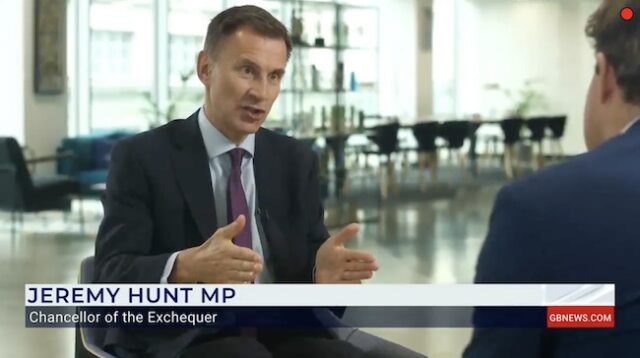THE Chancellor of the Exchequer has told GB News that the UK will avoid a recession “if we stick to the plan”.
Jeremy Hunt also said that financial institutions have been operating “effectively against the law” by de-banking people on the basis of their personal opinions.
He said: “Well, the Bank of England forecasts today say that we will avoid recession and in a year’s time we’ll get inflation down to about 3 per cent, 2.8 per cent, I think is the number.
“So, although it’s very tough when interest rates go up for families or for businesses that have got loans, what those forecasts are saying today is that if we stick to the plan, it is working and we will end up with a soft landing and we can avoid a recession.
“But what you’re talking about is a very fine judgement, which is what we pay the Monetary Policy Committee to do completely independently of politicians, because we want to make sure they get it right.”
On the Greenpeace protest at the Prime Minister’s home today over new North Sea drilling licences, Mr Hunt told GB News Economics and Business Editor Liam Halligan: “Well, I would just say that protesters should obey the law.
“And with respect to that decision, I will also point out that everyone says that in the transition to net zero, we’re going to continue to use gas and gas from our own gas fields in the North Sea uses about a third of the carbon of gas that you import from the other side of the world. So this is actually a pro-climate, pro-energy independence, sensible measured decision.”
Asked if it was a step too far to scale the PM’s house, he added: “Do I approve? Of course I don’t. But they should obey the law and it’s for the police to make sure they do.”
On the Nigel Farage de-banking scandal, he said: “Well, that is a matter for the NatWest board but what I would say is that as a major shareholder in NatWest, we were very concerned that after this error of judgement, which was conceded by NatWest, they were following the course they were.
“Why? Because in a free society, [to] be able to say what you believe is a fundamental human right. But in the modern world, we all need bank accounts.
“So if you have to worry that you might be expressing a view that someone in a bank doesn’t agree with and you could lose your bank account, that has a chilling effect on free speech, that is not acceptable.
“It is also against the banking regulations, it is effectively against the law. So, today I’ve written to the regulator that has the power to put big fines on banks.
“And I’ve said I want to know, is this widespread? Was it a one off thing or is it more widespread? And what are we doing about it to make sure that banks obey the law?”
On the chairman of NatWest initially backing CEO Alison Rose, he said: “Well, you know, they changed their mind. And the reality is that NatWest got this wrong, plain and simple.
“The board has taken action. What I’m now wanting to make sure [of] is that this isn’t more widespread, because I think this will be a very, very big step in the wrong direction and we need to stamp it out if it is.”
Asked about GB News’ Don’t Kill Cash campaign, he said: “I would say two things. I would say first of all, any economy has to be run for the benefit of everyone.
“And that includes your most vulnerable, older people who may not have credit cards and depend on cash, and it’s very important they can access services in the way they’ve always accessed them. So that’s [the] number one principle
“The number two principle relates to what we were talking about with Nigel Farage and de-banking. For many people, there is an anonymity in the way they use cash, which is an intrinsic part of being in a free society where corporations and the state can’t keep tabs on every single way that you spend money.
“So yes, we’re moving to a more cashless society. That’s very convenient for lots of people. It’s very good for lots of retailers and has lots of advantages, but we need to bear those things in mind.”
Asked if the 2030 ban on petrol and diesel vehicles should be pushed back, Mr Hunt said: “But I think that deadline is important because it encourages a lot of investment, such as the new gigafactory, the electric battery factory that Jaguar Land Rover said they will build just a few weeks ago in Somerset, that’s going to create 4,000 new jobs.
“So if you want to encourage that investment from all over the world, you have to have a clear deadline.
“But what the Prime Minister has said is that, as we transition to electric vehicles, we need to do so in a way that is proportionate and sensible and takes account of the people who will still be driving vehicles that aren’t electric.
“And so that’s what the Conservative approach is. We say, ‘yes, we’re going to make this change, we’re going to do it sensibly’. We’re sticking with 2030 but we’re going to do it in a pragmatic way.”




